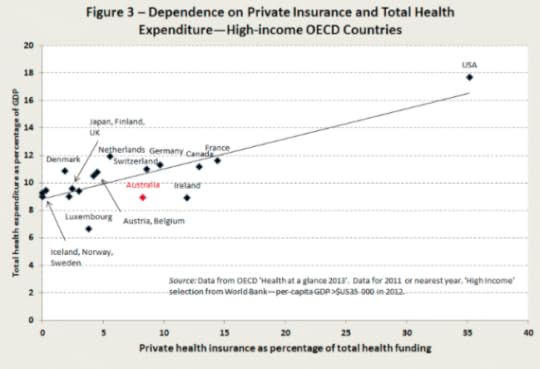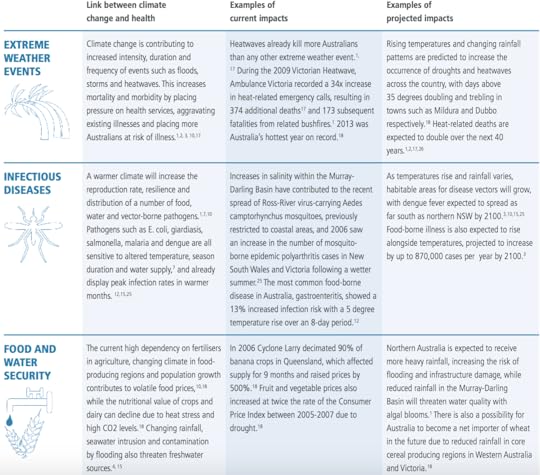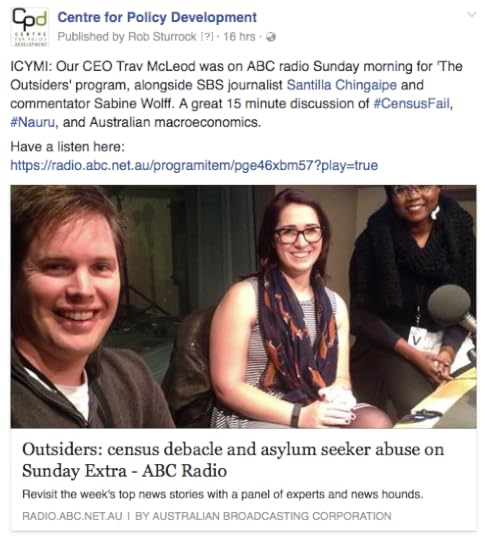Centre for Policy Development's Blog, page 38
August 21, 2016
Chairperson Terry Moran talks public service on University of Melbourne podcast
CPD Chairperson Terry Moran was a guest of the University of Melbourne Vice-Chancellor Glyn Davis on his podcast The Policy Shop.
At the centre of the half hour discussion was the difficult question; “Has the public service lost the plot?”. Terry was called upon for his extensive public service expertise alongside Professor Helen Sullivan to discuss the current role and failures of Australia’s waning public sector. Rather than condemning the ABS for the widely publicised and embarrassing #Censusfail, Terry blames “successive governments that have denied investment” in essential public sector agencies. Terry concludes however, that there are some reasons to be cautiously optimistic for the future of the public service.
An edited transcript of the discussion can be found here, or the podcast can be listened to and downloaded here.
[soundcloud url=”https://api.soundcloud.com/tracks/279...″ params=”auto_play=false&hide_related=false&show_comments=true&show_user=true&show_reposts=false&visual=true” width=”100%” height=”450″ iframe=”true” /]

The post Chairperson Terry Moran talks public service on University of Melbourne podcast appeared first on CPD.
August 15, 2016
Travers McLeod on ABC Radio National’s Outsiders
On Sunday CPD CEO Travers McLeod joined Santilla Chingaipe and Sabine Wolff as guests on Radio National’s Outsiders program with Jonathan Green.
The panel discussed the latest revelations about conditions for asylum seekers on Nauru, the disrupted Census, and outgoing RBA Governor Glenn Stevens remarks about Australia’s economic policy outlook.
You can listen to the full 15 minute discussion here: https://radio.abc.net.au/programitem/pge46xbm57?play=true

The post Travers McLeod on ABC Radio National’s Outsiders appeared first on CPD.
August 8, 2016
CPI and CPD deliver roundtable on settlement services for refugees
Across western democracies there are increasingly heated public discussions about the role of immigration in society. Despite the economic and social benefits of immigration being well documented, the consensus supporting immigration is fraying. It is a pivotal time then to reaffirm Australia’s commitment to immigration and look for ways to improve how we integrate refugees into our diverse society.
With this context as the backdrop, on 3 August, CPD and the Centre for Public Impact (CPI) – a not-for-profit foundation set up by Boston Consulting Group – hosted a group of key stakeholders at BCG’s office in Melbourne to discuss the challenges and innovations in providing settlement services to refugees. Improving employment outcomes and labour market integration for refugees was a particular focus.
The three-hour roundtable was conducted under the Chatham House Rule and included public servants, service providers and policy advocates. The roundtable was also attended via video-phone by government representatives, policymakers and consultants from Canada, the United States and Germany, who shared their countries’ experiences in delivering settlement services for newly arrived refugees.
The discussion highlighted the importance of studying closely emerging settlement practices from comparative jurisdictions, particularly from those attempting to settle a higher volume of refugees. For instance, Germany is building new technology to expedite recognition of prior learning of refugees in partnership with vocational education providers and businesses. Canada takes the long view on refugee resettlement, views employment and language training as ‘critical enablers’, and has a strong track record of private and community sponsorship of refugees. The United States is a leader on providing microfinance for refugees to start their own businesses, boasting a 88 per cent business survival rate and a 98 per cent repayment rate. These and other jurisdictions hold a wealth of experiences and expertise that can enrich the Australian settlement approach.
Attendees agreed that the discussion was a valuable opportunity to swap notes and discuss what is working well and what needs to improve, and offered great ideas for further research by CPD and CPI.
CPD is grateful to BCG for hosting the roundtable, and looks forward to continuing the good work with CPI.
You can also read more about the work CPD is doing on building a regional approach to forced migration matters on our Asia Dialogue on Forced Migration page.

The post CPI and CPD deliver roundtable on settlement services for refugees appeared first on CPD.
BCG and CPD deliver roundtable on settlement services for refugees
Across western democracies there are increasingly heated public discussions about the role of immigration in society. Despite the economic and social benefits of immigration being well documented, the consensus supporting immigration is fraying. It is a pivotal time then to reaffirm Australia’s commitment to immigration and look for ways to improve how we integrate refugees into our diverse society.
With this context as the backdrop, on 3 August, CPD and the Centre for Public Impact (CPI)- a not-for-profit foundation set up by Boston Consulting Group – hosted a group of key stakeholders at BCG’s office in Melbourne to discuss the challenges and innovations in providing settlement services to refugees.
The three-hour roundtable was conducted under Chatham house rules and included public servants, service providers and policy advocates. The roundtable was also attended via video-phone by government representatives and policymakers from Canada, the United States and Germany, who shared their countries’ experiences in delivering settlement services for newly arrived refugees.
Attendees agreed that the discussion was a valuable opportunity to swap notes and discuss what is working well and what needs to improve, and offered great ideas for further research by CPD and CPI.
CPD is grateful for BCG hosting the roundtable, and looks forward to continuing the good work with CPI over the rest of this year.
You can also read more about the work CPD is doing on building a regional approach to forced migration matters on our Asia Dialogue on Forced Migration page.

The post BCG and CPD deliver roundtable on settlement services for refugees appeared first on CPD.
August 4, 2016
Fellows Chris Bonnor and Bernie Shepherd discuss NAPLAN results and education reform
The NAPLAN test results have been released and the annual contest over interpreting the performance of our school kids has begun. The results demonstrate a national performance plateauing in reading, writing and numeracy and provide yet another wake-up all to revisit education reform.
The Federal Minister of Education, Simon Birmingham, resumed his argument that needs-based funding to the more disadvantaged schools is not improving student performance, as he increasingly distances himself from the findings in the Gonski Review recommendations.
CPD’s recent report Uneven Playing Field: The State of Australia’s Schools, written by Education Fellows Chris Bonnor and Bernie Shepherd, showed growing gaps in disadvantage and inequity amongst our schools, and reaffirmed why full implementation of the Gonski Review was even more urgent than when its recommendations were released in 2011.
Regrettably the Turnbull Government is quick to talk about the need for innovation and ‘agility’ in our economy, yet equally committed to walking away from potential policy solutions that support their rhetoric.
This week, both Chris and Bernie were back in the media providing insights and analyses into the meaning of our NAPLAN results and advocating for a revitalisation of the Gonski Review recommendations. You can read their contributions to the debate here:
Chris and Bernie wrote an op-ed for The Guardian about why we will not lift our performance until proper, targeted needs-based funding of schools is delivered
Chris was interviewed by Melissa Davey at The Guardian about how the NAPLAN results demonstrate we are leaving disadvantaged school kids behind
Chris also provided comment for another Melissa Davey piece about why Minister Birmingham’s position on funding is not credible or helpful to the schools debate
Chris and Bernie wrote an op-ed for Crikey about why the NAPLAN results show us that better targeted schools investment based on need is sorely required across Australia.
Chris also discussed the NAPLAN results and the CPD report on SBS, Sky News and Sydney’s 2UE radio.
.@GuardianAus op-ed by Education Fellows Chris Bonnor + Bernie Shepherd on why #NAPLAN isn’t working for ushttps://t.co/OdmSdqt6LV#auspol
— CPD (@CentrePolicyDev) August 3, 2016

The post Fellows Chris Bonnor and Bernie Shepherd discuss NAPLAN results and education reform appeared first on CPD.
July 31, 2016
CPD researcher Ali Sutton on ABC TV’s Planet America
As the Australian election drew to a close and the long US election season started to ramp up, CPD was fortunate to be joined by Ali Sutton, a political campaigner and social policy expert from the United States.
Ali was part of then-Illinois State Senator Barrack Obama’s early field operation in Iowa ahead of the 2007 Iowa caucuses, and served as field director for ‘Americans Abroad for Obama’ during the 2008 Presidential campaign. She went on to work in various roles in Washington D.C., including as a presidential appointee in the Department of Health and Human Services. In that role much of Ali’s work focused on the welfare of children who had fled to the US from central America or were affected by detention or deportation of a parent.
Ali Sutton talks about #DNCinPHL, #FeelTheBern, #ImWithHer and #UnitedDems on #PlanetAmerica https://t.co/swDFDH6zMp pic.twitter.com/h2FsPLkP5k
— Rob Sturrock@CPD (@RobSturrock_CPD) July 29, 2016
Ali drew on this expertise while at CPD to help organise a high-level roundtable on resettlement services for humanitarian refugees, connecting experts from Australia, the US, the UK and Germany to discuss new insights and approaches from around the world.
Ali also found time to join John Barron and Chas Licciardello as a panelist on two episodes of the ABC’s Planet America program, to discuss the ins and outs of the Republican and Democratic national conventions.
You can see these episodes in full below:

The post CPD researcher Ali Sutton on ABC TV’s Planet America appeared first on CPD.
July 27, 2016
Ian McAuley: Private health insurance and public policy
Today CPD Fellow Ian McAuley delivered a presentation to the 2016 Health Insurance Summit on the subject of private health insurance and its impact on broader public health and policy outcomes in Australia.
In a paper to accompany the presentation, Ian argues that the rising costs to individuals and the public associated with private health insurance should be attracting much greater scrutiny:
“Private health insurance has generally been quarantined from the economic scrutiny that successive governments have applied to other sectors of the economy. Rather than being based on any firm economic model, financial support for private health insurance has been based on partisan preferences, with Coalition governments notably more enthusiastic than Labor governments to support it…
In the absence of economic analysis of the costs and benefits of private insurance, governments, particularly Coalition governments, have argued to defend its privileged position – relieving pressure on public hospitals, providing choice, protecting the “private system” – and have suggested that publicly-funded health should be re-defined as distributive welfare for the needy rather than as a shared universal service.
But as a means of sharing health care costs, private insurance is a high-cost and inequitable mechanism to achieve what the tax system and a single insurer can do far better. Its administrative overheads are high, and it lacks the incentives or capacity to control moral hazard and to contain health care costs.
Australia needs exposure of the cost of support for private health insurance (PHI), and, an open debate about health care funding – not the emotive “private” vs “public” rhetoric that often takes place, but rather the basic question about how much we should take personal responsibility for paying for our own health care, without insurance, and how much we should share through Medicare. If the options are explained clearly Australians may accept a reasonable regime of co-payments, so long as they are not seen as a wedge to allow private insurance to destroy Medicare.

Ian concludes that there is “a pressing need for a thorough consideration of the way we fund health care.”
“The fundamental question isn’t about “public” or “private” – delivery of health care will always be predominately through the private sector.
Rather, it should be about the extent we pay from our own pockets and the extent we share the funding of health care through Medicare or a similar tax-funded single insurer.
There is also a need to bring PHI under thorough economic scrutiny, as has been the case for most other industry sectors. A starting point should be to expose the full cost of public support for PHI, including the subsidies built into the MLS arrangements, the transfers from young to old in the “lifetime rating” system, and any government-communicated impressions that those with means have a moral obligation to hold PHI, or that without PHI people will not be covered for health care expenses.
For many reasons – ageing, the availability of new technologies, rising expectations – the cost of health care will almost certainly go on rising in the foreseeable future. That should not be of concern. Even a modest rate of economic growth would still see areas of expenditure other than health care – education, housing, recreation and so on – growing…
Many will make the claim that because of that rising cost we cannot afford a tax-funded insurer, but that is to confuse the meaning of “affordability”. Cost-shifting does not make a function more affordable. If, as evidence shows, a single national insurer can fund health care more efficiently than a multiplicity of private insurers, then it is a more affordable alternative. That’s the most assured way of keeping health care costs under control.”
Read the full paper, and recent coverage of Ian’s analysis, below:
Private health insurance and public policy – Ian McAuley, July 2016
How average earners will be pushed into private health insurance by 2020 - Caitlin Fitzsimmons, SMH, 23 July 2016.
For more on the potential pitfalls of Australia’s approach to private health insurance, see earlier work by Ian in conjunction with other CPD fellows Jennifer Doggett and John Menadue:
Submission to private health insurance consultations – Ian McAuley and Jennifer Doggett, December 2015
No wonder we’re wasting money in health care – we got the incentives wrong – Ian McAuley, Jennifer Doggett and John Menadue, October 2015

The post Ian McAuley: Private health insurance and public policy appeared first on CPD.
July 12, 2016
Building a national strategy for climate, health and wellbeing
In June the Climate and Health Alliance (CAHA) published a new discussion paper Towards a National Strategy on Climate, Health, and Well-being for Australia.
CPD fellow Fiona Armstrong is the founder and Executive Director of CAHA and a co-author of the discussion paper.
The paper cites strong empirical evidence that climate change poses significant immediate and long term impacts to the health of Australians, including in the following areas. The paper also examines national mitigation and adaptation policies, with a particular focus on how effectively they acknowledge and respond to health-related impacts of climate change.

The paper finds that, despite the significant potential for ambitious mitigation policies to benefit human health and lead to substantial cost savings, health and the health sector have been afforded little consideration in the development of national climate change policy in Australia. It calls for a national strategy for climate, health and wellbeing that seeks to:
Establish meaningful national emissions reductions targets and policies
Establish effective governance arrangements
Develop a sustainable and resilient healthcare sector
Promote education and awareness
Strengthen communication and collaboration
Re-establish national research capacity.
You can read the discussion paper and CAHA’s recommendations in full here: http://caha.org.au/wp-content/uploads/2016/06/CAHA-Discussion-Paper-v04.pdf.
Related work on climate, health and wellbeing
Also in June, Fiona Armstrong’s provided a scorecard for Croakey to track how the major parties policies on climate and health stacked up in the 2016 federal election.
Last year, CPD Policy Director Rob Sturrock spoke about how climate change will impact human security and community health at the Third Population Health Congress in Hobart. This drew on CPD’s 2015 report The Longest Conflict which examined how climate change would impact defence and security in Australia and our region.

The post Building a national strategy for climate, health and wellbeing appeared first on CPD.
July 8, 2016
Voters were doubly disillusioned – Travers McLeod and Mark Triffitt
On Saturday, Australia’s political system crossed a line. From the normal messiness of democracy into fragmented incoherence. From voter unrest to potential revolt.
The implications are clear: instability is no longer a one-off in Australian politics but a pattern. Out-of-touch political leadership is no longer an individual failing but systemic
The enemies of the major parties may no longer be each other. Their principal enemy is fast becoming the ballot box.
Nearly one in every four Australians directed their first preference away from the major parties. The Labor Party is on track to record its second-lowest primary vote since 1949. The Coalition has done worse on its first preferences only three times in a similar period.
This so-called protest vote against the political establishment has grown at each federal election since 2007.
The trend is inescapable. Voters are doubly disillusioned.
Tellingly, in their election-night speeches neither the Prime Minister nor the Labor leader spoke principally to the country: their primary audience was party members. Faithful as they are, that audience is ever diminishing and ever less representative.
Mr Turnbull’s silence since becoming Prime Minister on the issues that generated his popularity was deafening.
Mr Shorten’s embrace of some bold ideas and essential human services secured a comeback, potentially to government.
But his party secured the first preference of only one in every three Australians.
At least he understood Saturday night was about “the Australian people” and not the police.
The growing schism between Australia’s democracy and the people cannot be papered over, irrespective of who emerges in charge.
Yet, based on their election-night speeches, both major parties – and the political class generally – seem to be in denial about the depth and breadth of disaffection.
Life governing in Canberra will continue to be nasty, brutish and short unless we find a way to reform the system and bridge our yawning democratic disconnect.
Successful democracies are stable but they are not static. And that is what our system has become.
How do we rebuild trust and engagement in Australia’s democracy?
We need to rebuild its current 19th-century delivery system to align with the new realities of the contemporary world.
The ideas and roadmaps for renewal are there. The urgency has been lacking, however – until now.
Reform means giving the public a more direct and active role in policymaking through citizen panels, not mistaking compulsory voting for political engagement.
It means real-time, continuous funding disclosure to expunge corporate money from the political system and the “privatisation” of policy that it buys.
It means resourcing our public sector so it can identify and help those who are losing out in a globalised, hyperconnected world.
It means moving to four-year electoral cycles, and ensuring careerism in politics is the exception, not the rule.
It means letting backbenchers vote however they like sometimes.
It means respecting evidence that leads to good policy, not demeaning experts for partisan gain.
It means embracing coalitions and new measures of progress.
It means putting ideas at the heart of a new policy consensus that is inclusive of and relevant to the lives of everyone, not just a select few.
Make no mistake about Saturday’s outcome. The public was not offering mild criticism. The mood has shifted distinctively.
That’s why the most important action the new band of independents and minor-party winners can achieve is putting reform of our democratic system at the top of their agenda.
—
Dr Mark Triffitt is a CPD fellow and lecturer in politics at the University of Melbourne.
Travers McLeod is CEO at the Centre for Policy Development.
This piece first appeared in The Age on 5 July 2016.

The post Voters were doubly disillusioned – Travers McLeod and Mark Triffitt appeared first on CPD.
July 5, 2016
On tour in New Zealand talking public sector capability
During the week of Monday 20th June, Rob Sturrock (Policy Director) was in Wellington, New Zealand discussing the findings of Grand Alibis: How Declining Public Sector Capability Affects Services for the Disadvantaged, which he co-authored, and examining the Kiwis’ approach to the delivery of human services.
The Key Government, now in its third term, is reforming how it delivers services to its citizens. The centrepiece is its Better Public Service reforms – a list of 10 priority areas where the objective is to improve services to disadvantaged communities, tackling head on wicked social problems such as low skills, persistent unemployment and disease.
The government is also in the process of rolling out an ‘investment approach’ to social services. Using actuarial modelling the public sector identifies people most at risk of long term welfare dependency and disadvantage, and develops preventative strategies to deliver better targeted social programs. The implementation of these reforms has encouraged human service agencies to collaborate more, share data on their service users and look for more innovative ways to remedy persistent social problems in the community.
During his week, Rob met with the Deputy Prime Minister and long-serving Minister of Finance, the Hon Bill English MP, as well as several senior members of the Ministry of Social Development. He also met with representatives from the New Zealand Labor Party and the NZ Greens, as well as the New Zealand Council of Christian Social Services.
Rob gave several presentations to different audiences in Wellington, including a public seminar at the Institute for Governance and Policy Studies at the Victoria University. Throughout the week he was generously hosted by Kirsten Windelov, Policy Officer at the New Zealand Public Services Association.
On 4 July, Rob was published in The Dominion Post, one of NZ’s main newspapers, outlining key observations from his trip, reproduced below:
Aussie looks across ditch for social policy ideas
In February Australian Prime Minister Malcolm Turnbull would have eyed the latest guest at his Point Piper mansion, his New Zealand counterpart John Key, with envy.
Key heads a stable New Zealand Government actively redesigning social policy, tackling welfare dependency and reforming public institutions in the process.
At the Treasurer’s behest, the Australian Productivity Commission (APC) is now looking for ways to infuse market-based competition and contestability principles into government delivery of social services.
In an era of interconnected, globalised and complex policy challenges, inequality and disadvantage stalk many Australian communities.
Despite unprecedented economic prosperity, up to 1.5 million Australians experience entrenched disadvantage, and our child poverty rates are unchanged since the turn of the century. Entrenched service failures necessitate reform.
For the APC, the Key Government’s Better Public Services, and Social Investment Approach will be a compelling case study.
I came to Wellington on a fact- finding mission to better understand the Key Government reforms. It is refreshing to see an administration joining up government services for disadvantaged persons. Improved data infrastructure and exchange of data between agencies enables holistic service responses for New Zealand’s disadvantaged people.
In Australia, recent reviews, including a Victorian Royal Commission into Family Violence, heavily criticised data management practices of government agencies.
Yet the concept of setting numerical targets for tackling disadvantage is problematic. It can lead to unintended outcomes as agencies and providers ‘chase the numbers’ to achieve targets on paper that are not lasting solutions for service users.
In using an actuarial approach to draw boundaries around disadvantage, there is a risk that a government narrows the field to the point that people miss out on services, or that the government retreats from service delivery not considered in scope of the business case.
An holistic ‘return on investment’ (ROI) for social services could measure long- term economic and social wellbeing as well as long-term ‘welfare liability’ reduction.
Does the jobseeker have meaningful and stable employment prospects beyond the short term? Does the teenager with a newly obtained NCEA level 2 qualification now have a range of study or employment options open to them? An ROI approach can also empower the public sector to tackle root causes to major social problems.
For instance, treating rheumatic fever could include addressing damp housing situations as well as treating disease incidents via health services.
A major advantage of New Zealand’s reforms is that an iterative process of continuous learning has been created. As trials are expanded, measures can be adjusted.
Expect greater discussion in Australia about the applicability of ‘the New Zealand model’. One concern for me is that the Turnbull government has had a Reagan-esque belief that ‘government is the problem’. New Zealand’s public servants are the ones implementing the reforms.
In looking for ideas, Australia remains blind to the potential of an active, well-resourced and collaborative public sector in improving people’s lives. We must find the best service solution for citizens, be that in-house production, outsourced delivery or a hybrid of both options.
Otherwise we risk exacerbating the problems we’re trying to solve.

The post On tour in New Zealand talking public sector capability appeared first on CPD.
Centre for Policy Development's Blog
- Centre for Policy Development's profile
- 1 follower








